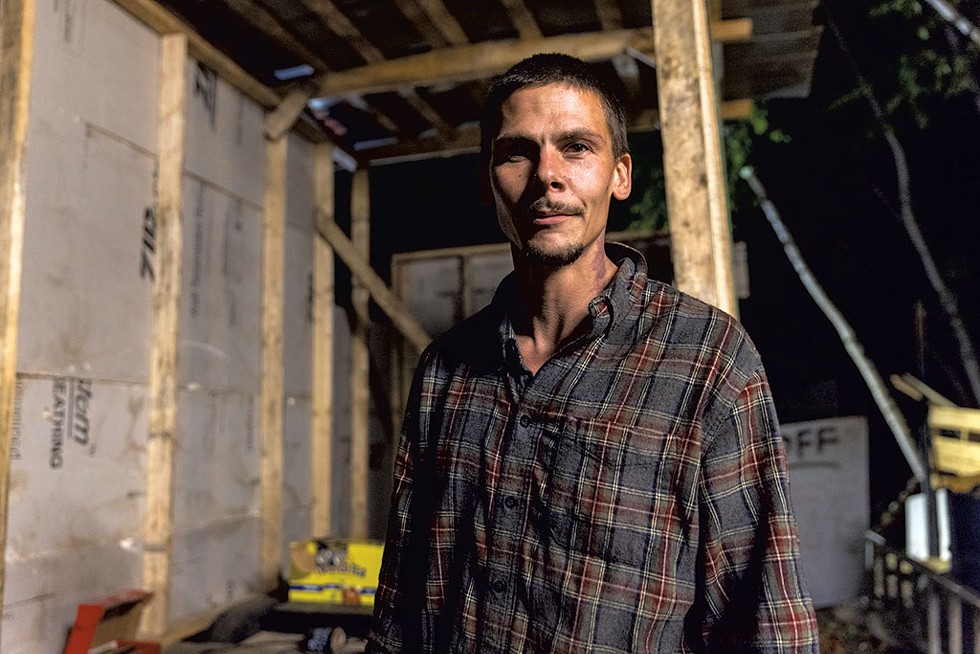
- James Buck
- Noah at his campsite
Photojournalist James Buck spent much of the last week with residents at the Sears Lane homeless encampment in Burlington ahead of Tuesday's scheduled eviction. Many of the residents who spoke with him declined to provide their full names. Here's what they did tell him.
Noah, 31
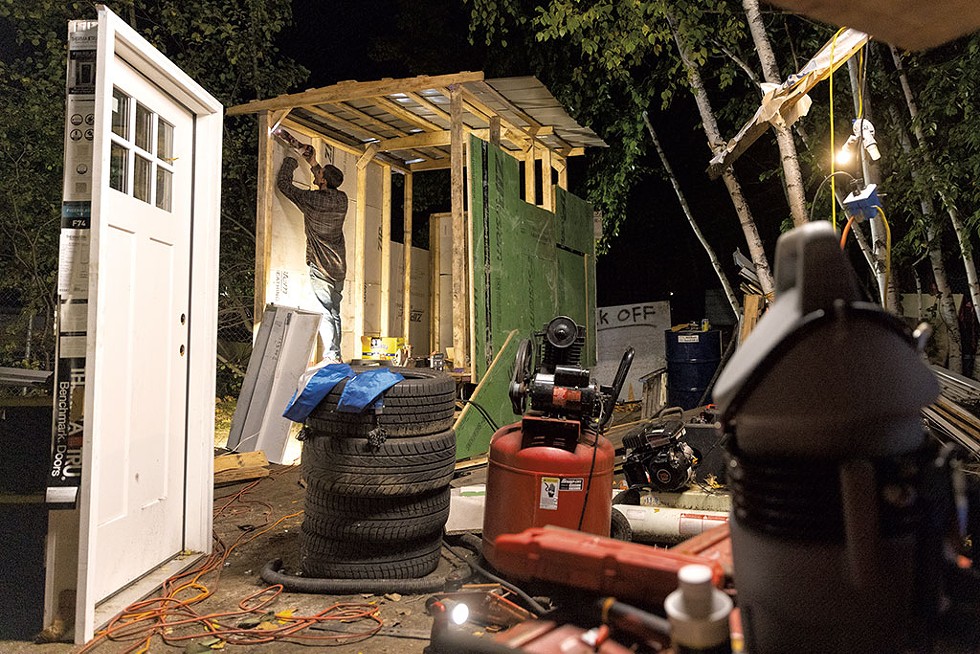
- James Buck
- Noah working on his storage shed at the camp
After he turned 18, Noah was homeless in downtown Burlington for two years. But he was able to rebuild his life, he said, spending a decade as a carpenter and tradesman.
"I was a normal member of society up until about two months ago," Noah said last week. "But when my son's mom left me, I said, 'Fuck it.' I stopped paying my bills and came out here."
Noah built a home and a workshop at the encampment. He's a skilled maker who took this journalist on an early morning dumpster-diving mission to salvage tools and materials for building sheds and trailers.
He also fixes up cars at his workshop and sells them, he said.
He'd made a life for himself at Sears Lane, living with his girlfriend, with whom he has a close bond, in an RV that he insulated himself, using electricity from a generator. Noah worries about his girlfriend, who recently learned that she was pregnant. He's very protective of her.
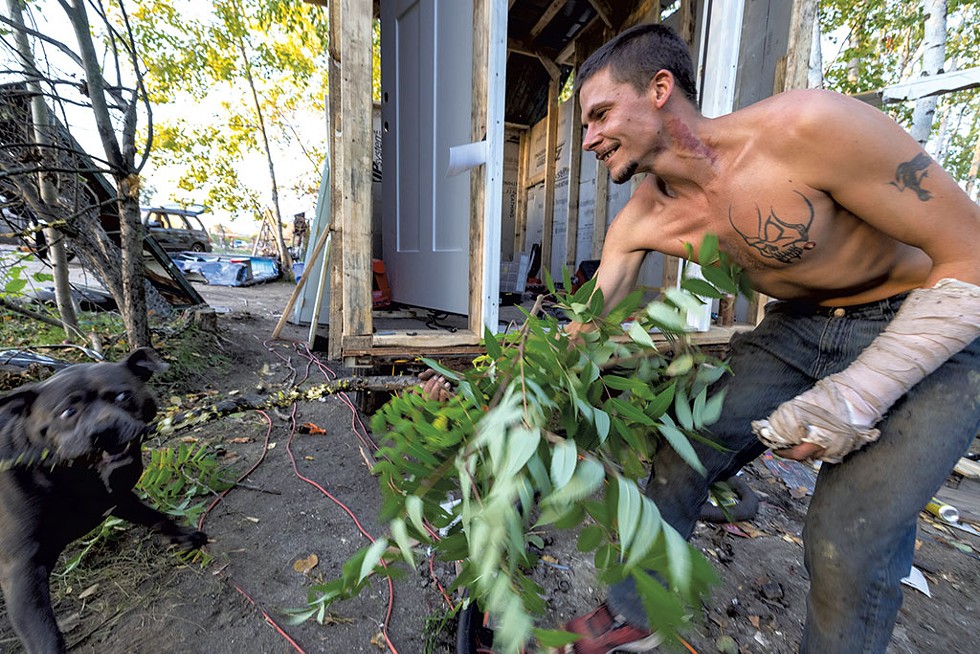
- James Buck
- "Leo saved my life," Noah said of his 90-pound dog.
"I don't want this life for myself, and I don't want it for her," he said.
Once the encampment became a hot political issue, local media crews would show up with cameras whenever there was a disturbance, an arrest or a move by the city to push people out. Residents, including Noah, felt their privacy was violated by the constant outside scrutiny.
Other intrusions were worse: People often stole his tools and materials, he said. Last week, Noah was frantically working to build a storage unit on his trailer to pack up his entire life and workshop as the city deadline loomed. His hand was broken, and he was under immense stress.
"I'm fucked," he said, despairing about how to move his workshop — and where he would go.
"It's bittersweet leaving here," he said, "but it's hard being here."
Carol, 36
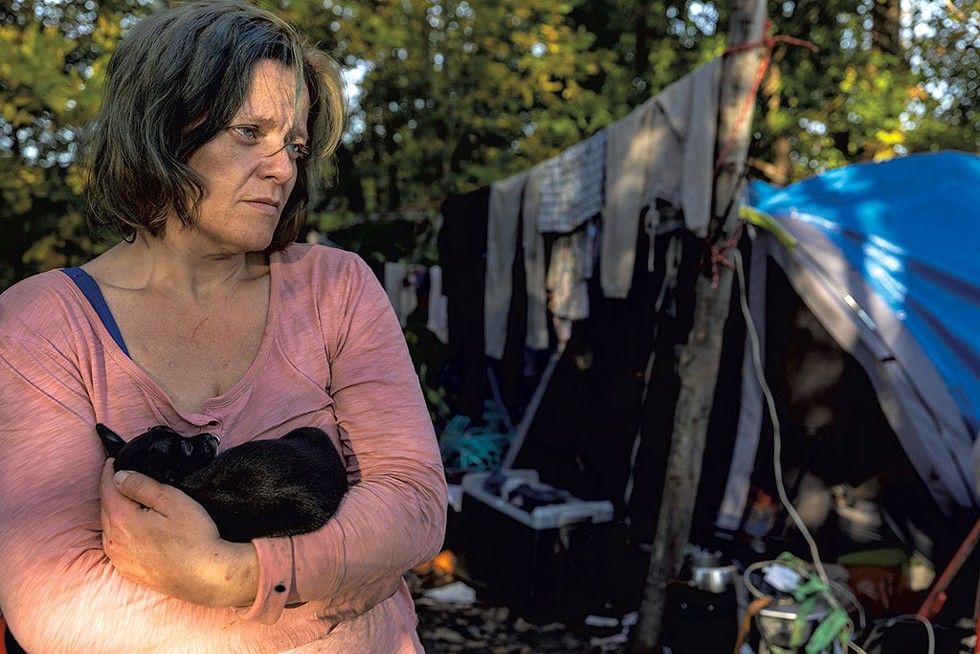
- James Buck
- Carol with her dog, Nibbler
Nibbler is a tiny 6-week-old Chihuahua puppy with big shoes to fill. His owner, Carol, lost custody of her children, ages 5 and 10. Heartbroken, she carries the puppy around.
"When the world rips everything from you and you got nothing, the pets help," Carol said, cradling the pup. "I would give anything to have my kids back," she said.
Carol writes poetry and creates art at the camp, where she's lived on and off for three years. She left more stable housing because of a family dispute. At the camp, she's lived a few months with her husband, Mitchell, in a tent connected to their car. The two of them work as roofers wherever they can. They're skilled tradespeople who make camp supplies out of scrap.

- James Buck
- Carol's husband, Mitchell, in their tent
She's frustrated by how the city treated the encampment. She feels like no one cares about residents, that they're just the dirt under everyone's feet — disposable. When people pass on the street, they stare or snub their noses, she said.
"I just want to show people the truth, open their eyes, see the people they're hurting. They think, because we're nobodies, they can push us around," she said.
But Sears Lane is a community, she said; people look out for each other. They check in on her. She has a painful wound on her leg and gets medical care for it when she can. She doesn't want to see the encampment destroyed.
"These people have worked so hard for this community," she said, "and they deserve to keep it."
Jordan Orcutt, 27, and Lexy Grundy, 18
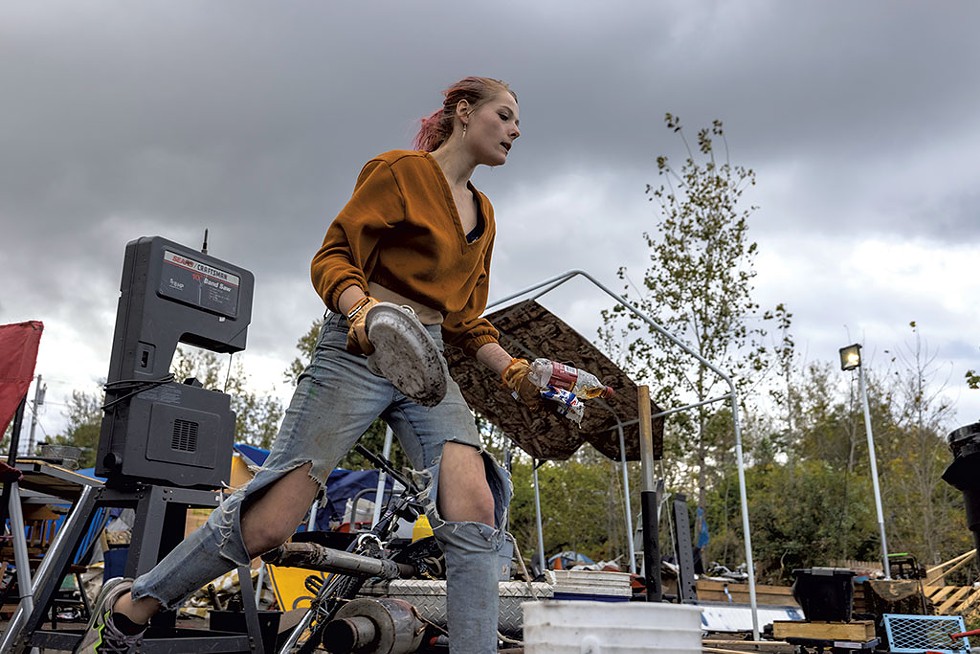
- James Buck
- Lexy Grundy at the encampment
The city deadline loomed in 12 hours, but Jordan Orcutt's sprawling workshop and makeshift home weren't anywhere near packed. "It's super stressful," he said.
Two years ago, he created a workshop for his woodworking at Sears Lane. He ended up sleeping in his car next to it when his apartment became unsafe, he said. He wound up living there and built an empire of woodworking and car repair. His plot is full of tools of every kind.
Orcutt is an artisan who makes tables, selecting and working pieces of wood until they're just right, often refinishing them several times. His eyes light up when asked about the pieces, and he will take them out one by one to introduce every interesting and unique board.
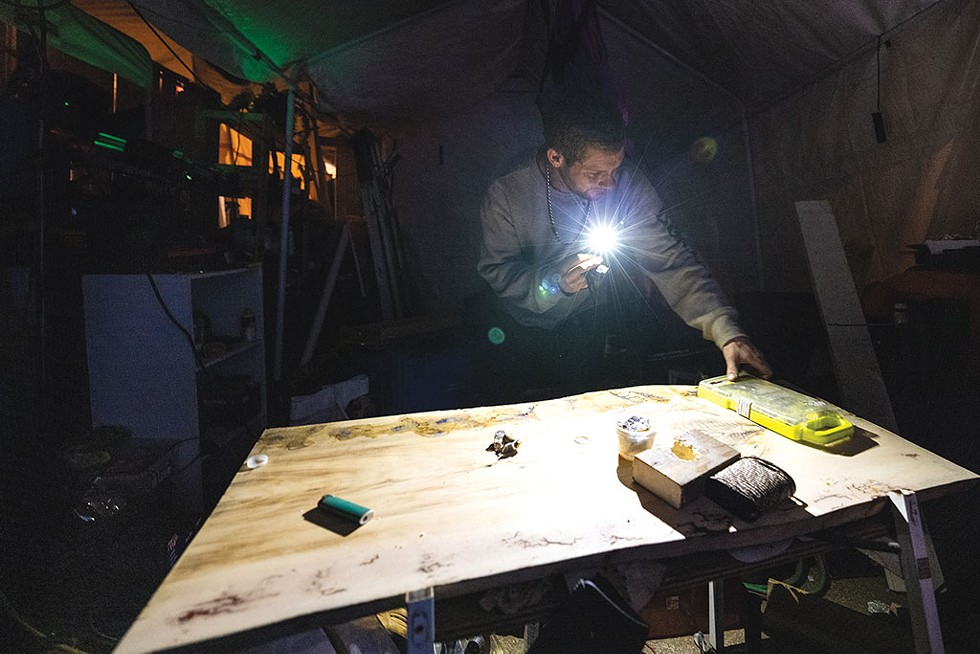
- James Buck
- Jordan Orcutt woodworking by flashlight
His home with his partner, Lexy Grundy, 18, anchored Sears Lane. But life there wasn't easy. Last winter, Grundy got frostbite on her hands and suffered nerve damage. They'd since insulated their home, made an oil burner and even put up security cameras. Everything they had, they said, came from dumpster diving. In less than a day, it was all supposed to be gone — somewhere.
"They don't care about us lower-class people," Orcutt said. "They want us to try to 'better ourselves,' but we're content as we are."
Grundy had called Sears Lane home for a year.
"We have our own community — even though we argue, which happens in families. I don't think I'd know what to do without this place," she said. "I'd probably be sleeping under a fucking bridge."
Ruth, 24, and Elijah, 27
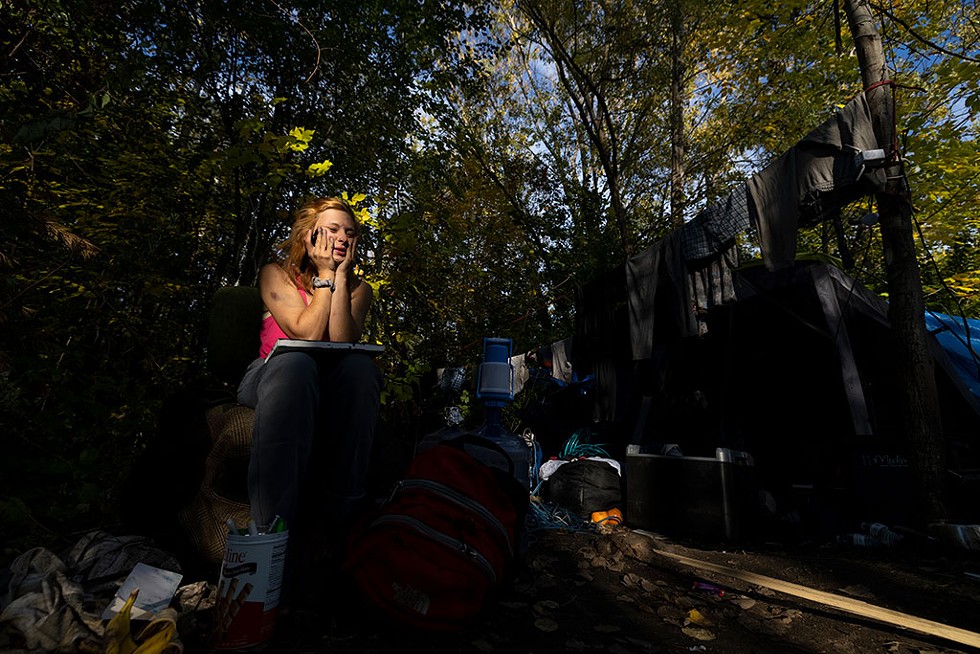
- James Buck
- Ruth during a quiet moment at the encampment
Ruth is an artist with a sunny temperament who makes paintings and delights in photography. But her cheerful demeanor is clouded by the loss of custody of her 2-year-old son to the Vermont Department for Children and Families.
"On the day I got my Section 8 apartment, DCF took my son," she said miserably, sitting in the woods on the outskirts of the camp. "And so I ended up here."
Her story is similar to those of others who described losing custody of their children and then struggling to handle the grief and rage.
"Not only have I lost my son and this time with him, but I've lost my home and my mental health," she said.
Her partner, Elijah, said the loss devastated her. She changed.
"That fucked her up ... I lost the woman I love. It's fucked me up too," he said through tears on Tuesday morning, as residents awaited in the cold and rain to be evicted.
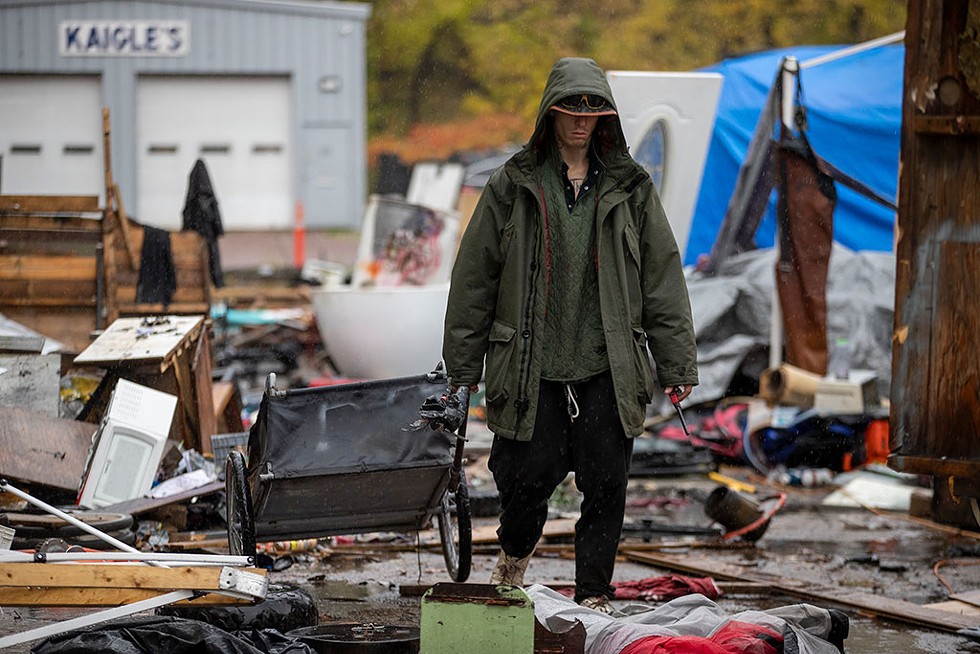
- James Buck
- Elijah packing up on Tuesday
Ruth loves to make things and asked to borrow my camera when I visited. I showed her how to use it, and she lit up with joy, happily arranging leaves and branches to photograph them just so.
She loves nature but finds living outdoors strange.
"The same thing people pay to do — go camping — is the thing we're trying to get out of," she said.
On the first night I photographed the camp, she lent me her pepper spray, so I'd be safe. But after I'd spent a week working there, she gently admonished me.
"I like you and care about what you do," she said, "but where were you before the tent city was getting shut down?"
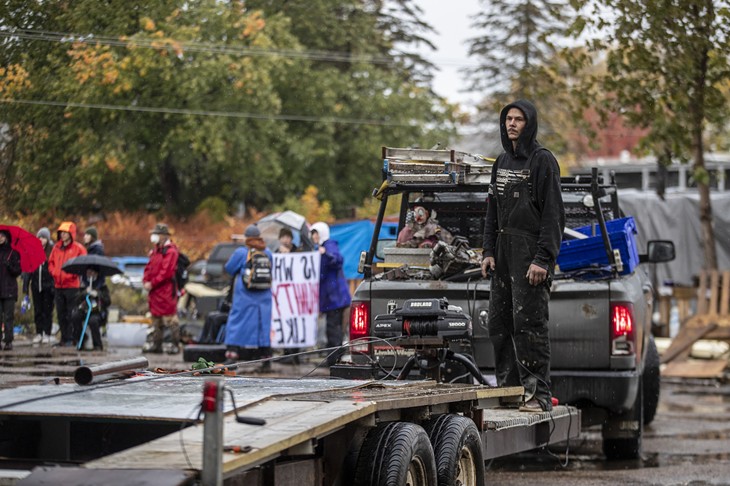
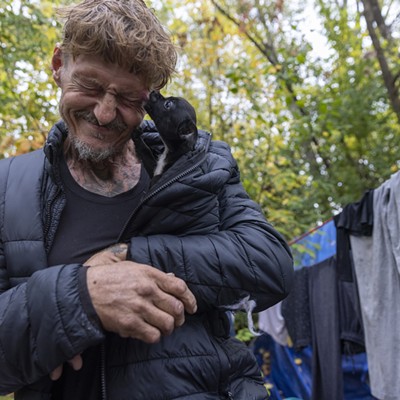
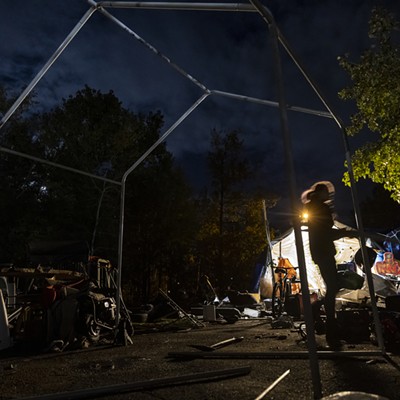
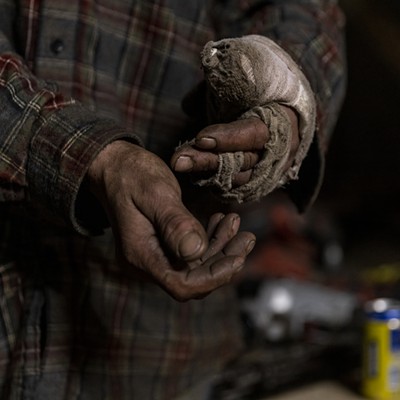
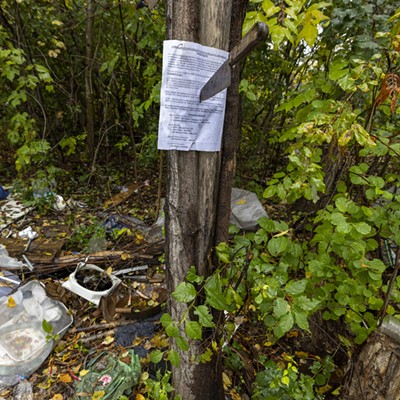
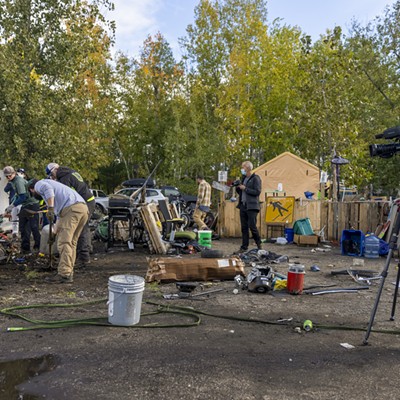
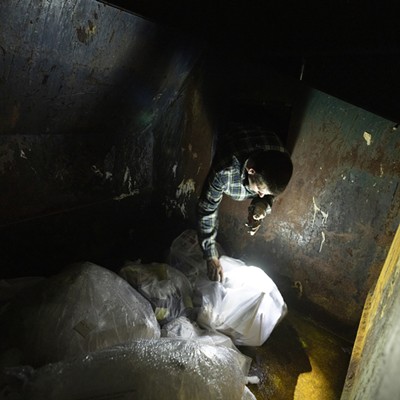
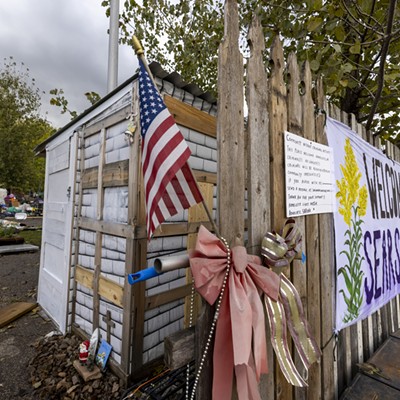
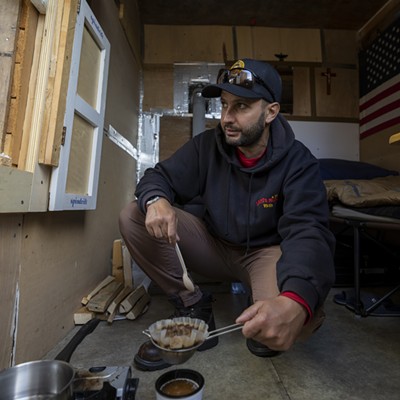
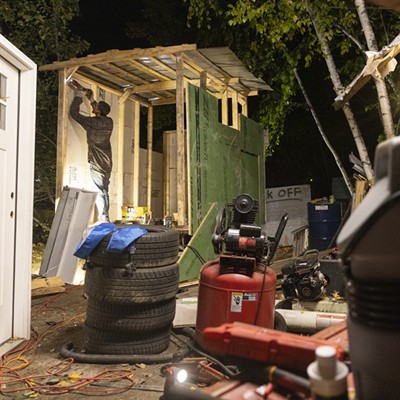

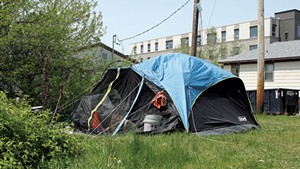













Comments
Comments are closed.
From 2014-2020, Seven Days allowed readers to comment on all stories posted on our website. While we've appreciated the suggestions and insights, right now Seven Days is prioritizing our core mission — producing high-quality, responsible local journalism — over moderating online debates between readers.
To criticize, correct or praise our reporting, please send us a letter to the editor or send us a tip. We’ll check it out and report the results.
Online comments may return when we have better tech tools for managing them. Thanks for reading.